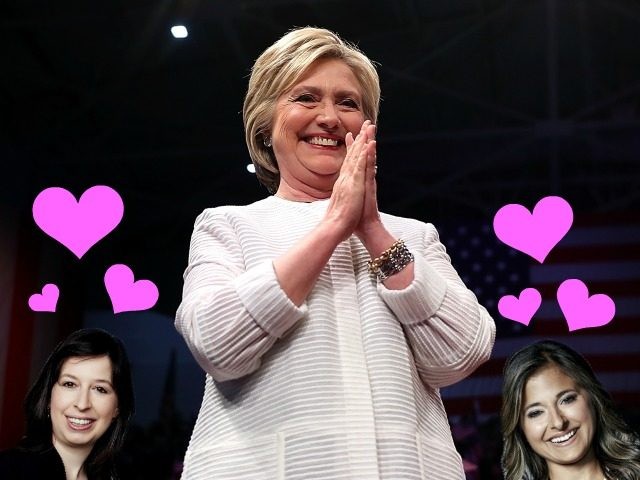
CNN Money’s “fact-checkers” Cristina Alesci and Laurie Frankel ended up with egg on their faces on Wednesday after they rated as “false” a well-established and proven Clinton Cash fact involving Hillary Clinton’s State Dept. approving the transfer of 20 percent of U.S. uranium to the Russian government, as nine investors in the deal funneled $145 million to the Clinton Foundation.
Under the guise of “fact-checking” Donald Trump’s Wednesday speech, Alesci and Frankel purported to verify whether “Clinton’s State Department approved the transfer of 20% of America’s uranium holdings to Russia while nine investors in the deal funneled $145 million to the Clinton Foundation.”
Alesci (pictured, right) and Frankel (left) rate the claim as “false” and allege “there’s no hard evidence of a quid pro quo.” The CNN Money “reporters” also conceded that “CNN several times has asked the Clinton Foundation to confirm whether the nine investors who benefited from the deal also contributed to the foundation, but the foundation has yet to respond.”
Why Alesci and Frankel couldn’t confirm the $145 million in Clinton Foundation donations for themselves is curious. Indeed, in a 4,000-word front page story written over a year ago, the New York Times’ Pulitzer Prize-winning investigative journalist Jo Becker and Mike McIntire verified the Clinton Cash uranium revelation in stunning detail, including charts and graphs laying out the flow of millions of dollars from the nine investors in the uranium deal who flowed $145 million to Hillary’s family foundation. Since Alesci and Frankel appear unable to perform basic journalistic research, here are the names and amounts they are still waiting on the Clinton Foundation to get back to them on:
- Frank Giustra, Canadian mining magnate who created a company that later merged with UraniumOne, gave $31.3 million and a pledge for $100 million to the Clinton Foundation
- Frank Holmes, a shareholder in the deal who donated between $250,000 and $500,000 (the Clinton Foundation doesn’t report exact amounts, only in ranges) and is a Clinton Foundation adviser
- Neil Woodyer, Frank Giustra’s colleague who founded Endeavor Financial and pledged $500,000 as well as promises of “ongoing financial support”
- Robert Disbrow, a Haywood Securities broker, the firm that provided “$58 million in capital to float shares of UrAsia’s private placement,” gave the Clinton’s family foundation between $1 and $5 million, according to Clinton Cash
- Paul Reynolds, a Canaccord Capital Inc., executive who donated between $1 million and $5 million. “The UrAsia deal was the largest in Canaccord’s history,” reports Schweizer
- Robert Cross, a major shareholder who serves as UrAsia Energy Director who pledged portions of his future income to the Clinton Foundation
- Egizio Blanchini, “the Capital Markets vice chair and Global cohead of BMO’s Global Metals and Mining group, had also been an underwriter on the mining deals. BMO paid $600,000 for two tables at the CGS-GI’s March 2008 benefit”
- Sergei Kurzin, the Russian rainmaker involved in the Kazakhstan uranium deal and a shareholder in UrAsia Energy, also pledged $1 million to the Foundation
- Uranium One chairman Ian Telfer committed $2.35 million